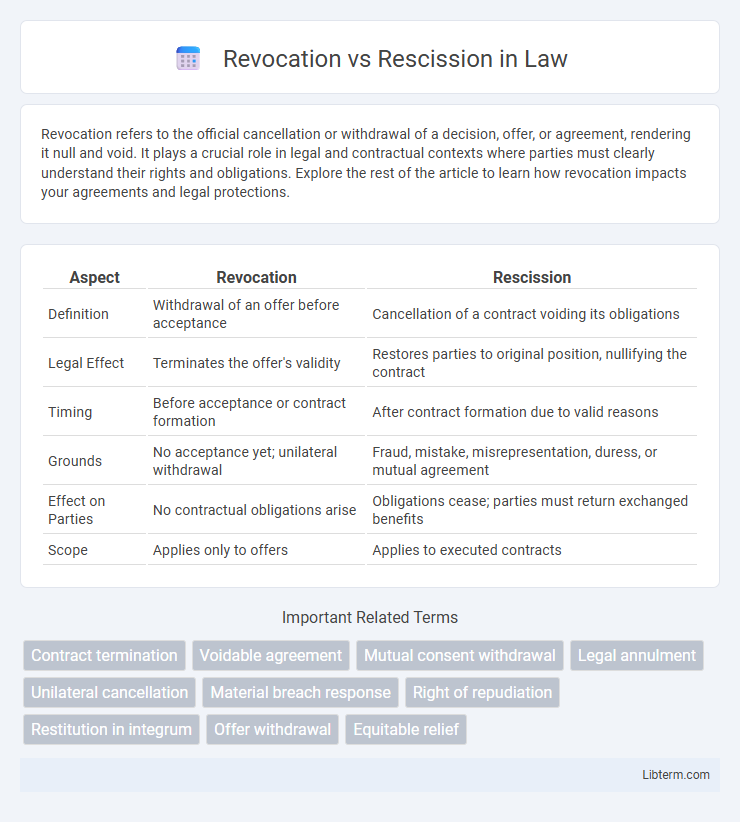Revocation refers to the official cancellation or withdrawal of a decision, offer, or agreement, rendering it null and void. It plays a crucial role in legal and contractual contexts where parties must clearly understand their rights and obligations. Explore the rest of the article to learn how revocation impacts your agreements and legal protections.
Table of Comparison
| Aspect | Revocation | Rescission |
|---|---|---|
| Definition | Withdrawal of an offer before acceptance | Cancellation of a contract voiding its obligations |
| Legal Effect | Terminates the offer's validity | Restores parties to original position, nullifying the contract |
| Timing | Before acceptance or contract formation | After contract formation due to valid reasons |
| Grounds | No acceptance yet; unilateral withdrawal | Fraud, mistake, misrepresentation, duress, or mutual agreement |
| Effect on Parties | No contractual obligations arise | Obligations cease; parties must return exchanged benefits |
| Scope | Applies only to offers | Applies to executed contracts |
Introduction to Revocation and Rescission
Revocation refers to the action of withdrawing or canceling an offer or contract before it is accepted, effectively terminating the agreement's validity. Rescission is the legal act of nullifying a contract, restoring the parties to their original positions as if the contract never existed, typically due to misrepresentation, fraud, or mutual mistake. Understanding the distinction between revocation and rescission is crucial in contract law to determine the appropriate remedy and timing for invalidating or withdrawing agreements.
Definitions: What is Revocation?
Revocation is the legal act of withdrawing or canceling an offer, contract, or authorization before it has been accepted or fully executed. It terminates the offeror's power to create a contract, rendering the offer invalid and unenforceable. Revocation must be communicated to the offeree to be effective and prevent contract formation.
Definitions: What is Rescission?
Rescission is a legal remedy that cancels a contract and restores the parties to their original positions, effectively nullifying the agreement as if it never existed. It is used when a contract is entered into based on fraud, misrepresentation, mistake, undue influence, or mutual consent to terminate the agreement. Unlike revocation, which withdraws an offer before acceptance, rescission acts on an executed contract to undo its effects and obligations.
Key Differences: Revocation vs. Rescission
Revocation is the withdrawal of an offer before acceptance, effectively nullifying the proposal, while rescission cancels a contract after it has been formed due to factors like misrepresentation or mutual consent. Revocation affects the negotiation phase and terminates the offer, whereas rescission terminates an existing contractual agreement and aims to restore parties to their original positions. Courts often require a valid reason for rescission, but revocation can generally occur anytime prior to acceptance unless an option contract limits this right.
Legal Grounds for Revocation
Legal grounds for revocation typically include fraud, misrepresentation, undue influence, or lack of capacity at the time of contract formation. Courts often require clear evidence that the revocation is justified due to a fundamental defect impairing the validity of one party's consent. Unlike rescission, which nullifies a contract based on mutual agreement or equitable reasons, revocation targets specific legal faults invalidating the initial offer or acceptance.
Legal Grounds for Rescission
Legal grounds for rescission typically include misrepresentation, fraud, undue influence, mistake, duress, or lack of capacity, which compromise a party's consent to a contract. Courts permit rescission to restore the parties to their original positions when a contract is voidable due to these defects. Unlike revocation, which is a unilateral withdrawal of an offer before acceptance, rescission requires judicial intervention or mutual agreement based on these legally recognized grounds.
Impact on Contractual Parties
Revocation terminates an offer before acceptance, preventing contract formation and leaving no obligations for contractual parties. Rescission cancels an existing contract, restoring parties to their pre-contractual positions and often requires mutual consent or court order. The impact on contractual parties differs as revocation nullifies potential agreements, while rescission unwinds completed contracts and addresses restitution.
Procedures for Revocation and Rescission
Procedures for revocation involve the unilateral withdrawal of an offer before acceptance, requiring clear communication to the offeree to be effective. Rescission procedures demand mutual consent or court intervention to terminate a contract, often necessitating the restoration of parties to their original positions. Both processes ensure contract termination but differ in initiation and legal formalities.
Common Scenarios and Case Examples
Revocation typically occurs when an offer is withdrawn before acceptance, such as a seller retracting a home sale offer prior to buyer agreement, while rescission involves canceling an already executed contract due to factors like fraud or mutual mistake, demonstrated in cases where a contract is voided after discovery of misrepresented facts. Common scenarios for revocation include withdrawal of bids in auctions or retraction of job offers, whereas rescission often applies in real estate deals with undisclosed defects or service agreements impacted by breach of terms. Courts frequently analyze timing and intent to differentiate revocation from rescission, as seen in case law such as *Lucy v. Zehmer* for offer revocation and *Hochster v. De La Tour* illustrating anticipatory breach leading to rescission.
Choosing Between Revocation and Rescission
Choosing between revocation and rescission depends on the stage and nature of the contractual agreement; revocation is typically applicable before a contract is fully executed, allowing one party to withdraw an offer, while rescission cancels an already executed contract due to factors like misrepresentation or mutual mistake. Legal criteria for rescission often require restoring parties to their original positions, emphasizing fairness and equitable principles, whereas revocation is more straightforward, focusing on withdrawal of consent prior to acceptance. Courts scrutinize evidence of consent, timing, and the existence of fraud or duress when determining the appropriate remedy, making careful analysis essential for selecting the proper legal action.
Revocation Infographic

 libterm.com
libterm.com